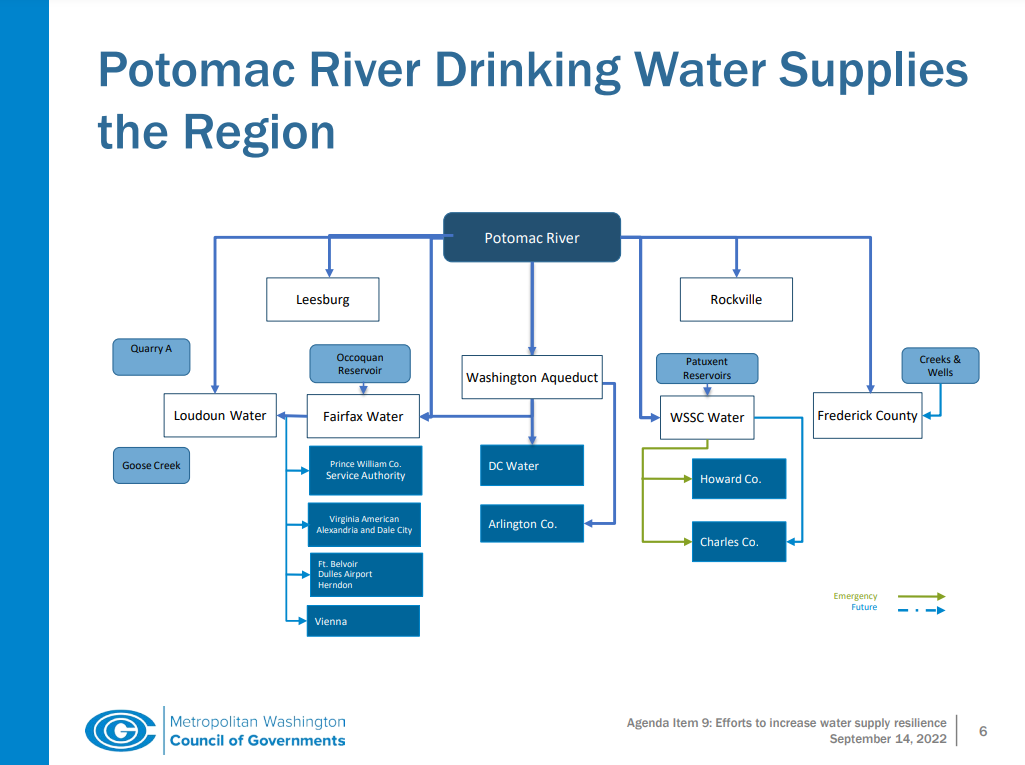The COG Board of Directors pledged its support for a federal feasibility study to identify and analyze water supply alternatives for metropolitan Washington to improve security and resiliency in the region’s water system. This action came after the board was briefed by representatives of area water utilities and local governments during the September COG Board meeting.
The Potomac River currently provides 78 percent of the region’s water supply and 100 percent of water to the District of Columbia and Arlington County. While emergency preparedness planning in the region has long evaluated the risks of drought, contaminant spills, and other threats to our water supply, climate change’s impacts to water access across the globe has only increased the need for greater resiliency in the current system and alternatives that would reduce reliance on the Potomac.
“We know that additional supplies will be needed to address extreme climate change scenarios and to provide resilience against spill type events in the Potomac,” explained Fairfax Water General Manager Jaime Bain Hedges. Panelists Thomas Hilton, Planning Division Leader for WSSC Water, Greg Emanuel, Arlington County’s Department of Environmental Services Director, and COG Principal Water Resources Planner Lisa Ragain joined the presentation to the board.

Water utilities and local governments in the region conduct long-term planning and use the results to guide investments in water infrastructure needed to meet future demand and other challenges. Area leaders agree that now is the time to evaluate options to address vulnerabilities in our water system and assure the region remains resilient against threats such as a severe drought. Still, improving resiliency and security by increasing water storage off the Potomac River, for example, is a significant undertaking requiring substantial resources and analysis. Board members say they are committed to the long-term process to identify and develop alternatives for the region.
“We know from the drought policy that we enacted in 1999 that water is not something we should take for granted. As local government officials, we need to educate, educate, educate,” asserted COG Board member and Fairfax County Mason District Supervisor Penny Gross.
Collaborating with area water utilities, local governments, and the Interstate Commission on the Potomac River Basin (ICPRB), COG is helping to lead an initiative to obtain federal funding and support to diversify the water supply and increase capacity for the region’s system. The study is the first crucial step in an effort that will include designing, building, and operating additional water supply and storage.
Regional efforts to increase awareness in Congress about the issue has resonated with legislators. U.S. Representative Eleanor Holmes-Norton of the District of Columbia led the effort to include the study in the U.S. House of Representative’s 2022 Water Resources Development Act (WRDA). The bill is currently in congressional conferencing, and the addition of this study received widespread bipartisan support in the House and Senate.
Board members recognized that a resilient water supply is the foundation to achieving its priorities as outlined in the Region United planning framework. In addition to supporting daily operations and infrastructure needs, a reliable water supply is essential to safe and affordable housing, public safety operations, and economic development.
“It is incumbent on us to take these actions now… when it’s not there [safe drinking water], we know who gets hurt the most,” stated COG Board Vice Chair and D.C. Councilmember Charles Allen.
The board approved a resolution to support a federal water supply feasibility study for the metropolitan Washington region as part of the 2022 Water Resources and Development Act (WRDA). The COG Board also committed to aiding in congressional outreach as well as public education and advocacy on the need for an alternative water supply for the region.
More: Certified Resolution R40-2022 - Endorsing Efforts to Support Electric Vehicle Deployment